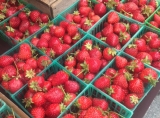
Certified Producer's Certificate (CPC)
If you produce fresh fruits, nuts, vegetables, herbs, cultivated mushrooms, shell eggs, honey, unprocessed grains, cut flowers or nursery stock in California you can apply for a Certified Producers Certificate (CPC) from the county where production occurs. Please read the instructions below before starting the application. Producers must practice the agricultural arts, which includes directive or actual responsibility for all the actions of planting, growing, fertilizing, irrigating, cultivating, pest control, and harvesting. Producers must also show that they have control of the property where production occurs. If you do not own the property, please see the requirements for Farm Leases below.
CPCs will only be issued for producers to sell at CFMs. If you are applying for a CPC in order to establish an approved source, your application will be denied and you will be referred to San Mateo County's Environmental Health Department.
CPCs can only be issued for certifiable agricultural products: fresh fruits, nuts, vegetables, herbs, cultivated mushrooms, shell eggs, honey, unprocessed grains, cut flowers or nursery stock. All products characterized as services, arts, crafts, bakery, candies, ceramics, soaps, balms, perfumes, cosmetics, pottery, clothing, fabrics, pastas, compost, fertilizers, candles, foraged foods, and types of wares are not defined as agricultural products and cannot be sold in the certified area of the CFM.
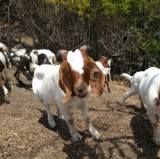
Non-certifiable Agricultural Products
Livestock (examples: chicken, beef) and livestock products (example: goats milk cheese) are considered noncertifiable agricultural products and we do not issue CPCs for those products. They may be sold in the certified area of the CFM without a certificate as long as it is the producer selling.
Noncertifiable agricultural products also includes all certified agricultural products that have been processed (ex: strawberry jam). The strawberries for the jam would need to have been grown by the certified producer to be sold within the certified farmers' market, but the jam would not be listed on the certificate.
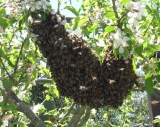
Honey
If you are a honey producer, please see the handout below for regulatory details regarding labeling, pesticide use, varietal honey, and organic honey. Any product advertised as organic must be registered with CDFA.
Only honey is a certifiable agricultural product. Pollen, unprocessed beeswax, propolis, royal jelly and honey comb would not be listed on the certificate, but are allowed to be sold within the certified farmers' market as long as honey is listed on the certificate. Soaps, lotions, candles and lip balms cannot be sold within the certified area.
University of California Agriculture and Natural Resources recently published this guide for Best Practices for Urban Beekeepers.
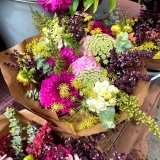
Nursery License
In order to sell seedlings, cut flowers, or potted plants, you will also need to apply for a Nursery License. The application should be submitted to California Department of Food and Agriculture (CDFA)'s Nursery, Seed, & Cotton Program along with payment.
If you are selling less than $1,000 and only within San Mateo County, you may qualify for a Fee Exempt Nursery License. This must be submitted to San Mateo County's Department of Agriculture for processing.
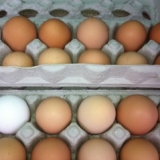
Chicken Eggs
If you would like to sell chicken eggs (shell eggs) you will also need to register as an Egg Handler with CDFA's Egg Safety and Quality Management Program. Many of the requirements for Shell Egg Handlers (including the labeling requirements) can be found in the Shell Egg Handler Information brochure.
As of January 1, 2019, handlers of eggs from all species of fowl must register. If you would like to sell duck or quail eggs, you must also register with CDFA Egg Safety and Quality Management Program.
Banners
All producers must post a banner with the following information when selling at a CFM:
1) Name of the Farm or Ranch (that matches what is on the CPC)
2) County where production occurs
3) "We grow what we sell" or similar statement
California Small Farm Food Safety Guidelines
Producers must certify that they are knowledgeable and intend to produce in accordance with good agricultural practices as published by CDFA. You can find the California Small Farm Food Safety guidelines in multiple languages here.